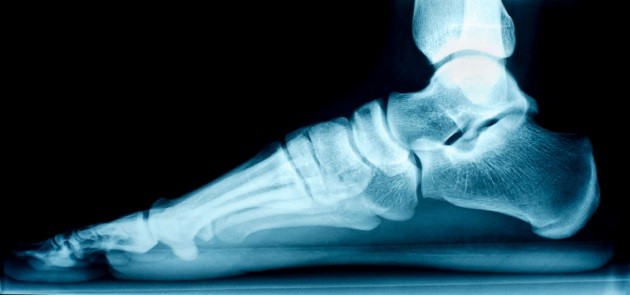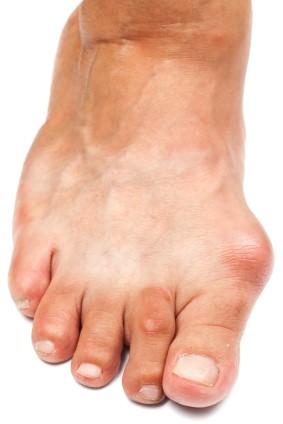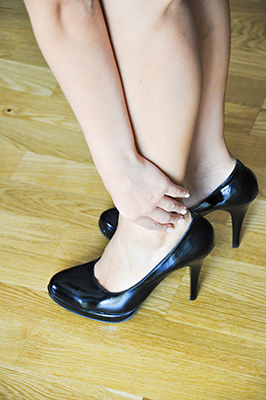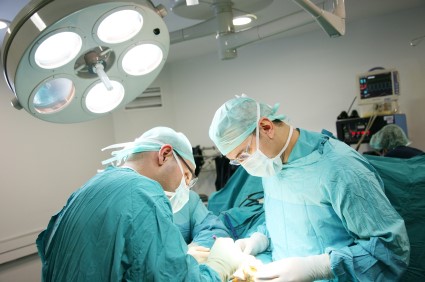Blog
Living with Flat Feet
 People with pes planus, or flat feet, have a flattening of the arch in their foot. Flat foot is normal in young children and infants. Fortunately, the foot usually corrects itself as muscles strengthen and soft tissues stiffen. However, flat foot does not always go away for some people. People who have flat feet have to deal with the pain and disability that it causes for the rest of their lives. Flat feet only need to be treated if they cause severe pain in those who have them.
People with pes planus, or flat feet, have a flattening of the arch in their foot. Flat foot is normal in young children and infants. Fortunately, the foot usually corrects itself as muscles strengthen and soft tissues stiffen. However, flat foot does not always go away for some people. People who have flat feet have to deal with the pain and disability that it causes for the rest of their lives. Flat feet only need to be treated if they cause severe pain in those who have them.
Every day foot care is very important, especially for those that are lacking the proper foot care resources. For more information about everyday foot care, contact Dr. Michael E. Newman of Pennsylvania. Our doctor will assist you with all of your podiatric concerns.
What are Flat Feet?
Flat feet are a condition in which the arch of the foot is depressed and the sole of the foot is almost completely in contact with the ground. Standing about 20-30% of the population generally has flat feet because their arch never formed during growth.
Conditions & Problems:
Having flat feet makes it difficult to run or walk because of the stress placed on the ankles.
Alignment – The general alignment of your legs can be disrupted, because the ankles move inward which can cause major discomfort.
Knees – if you have complications with your knees, flat feet can be a contributor to arthritis in that area.
Symptoms:
Pain around the heel or arch area
Trouble standing on the tip toe.
Swelling around the inside of the ankle.
Flat look to one or both feet.
Having your shoes feel uneven when worn
Treatment:
If you are experiencing pain and stress on the foot you may weaken the posterior tibial tendon, which runs around the inside of the ankle.
If you have any questions please feel free to contact our office located in Plymouth Meeting and Ambler, PA. We offer the newest diagnostic and treatment technologies for all your foot and ankle needs.
Treat Your Bunions
 Bunions are described as painful bumps that grow on the side of the big toe. If you have a bunion, you should get rid of any shoes that don’t fit well. You should also use bunion pads on the inside of your shoes in order to ease pressure. Icing your bunion for twenty minutes a few times a day can also help treat your bunion. Additionally, anti-inflammatory drugs can be used to get rid of pain and reduce swelling.
Bunions are described as painful bumps that grow on the side of the big toe. If you have a bunion, you should get rid of any shoes that don’t fit well. You should also use bunion pads on the inside of your shoes in order to ease pressure. Icing your bunion for twenty minutes a few times a day can also help treat your bunion. Additionally, anti-inflammatory drugs can be used to get rid of pain and reduce swelling.
Bunion surgery usually occurs after non-surgical methods have proved to be ineffective. If you have any concerns, contact Dr. Michael E. Newman of Pennsylvania. Our doctor will assess your injury and provide you with quality treatment.
What is a Bunion?
A bunion is formed of swollen tissue or an enlargement of boney growth, usually located at the base joint of the toe that connects to the foot. The swelling occurs by the bones in the big toe shifting inward, which impacts the other toes of the foot. This causes the area around the base of the big toe to become inflamed and painful.
Why do Bunions Form?
- Genetics – susceptibility to bunions are often hereditary
- Stress on the feet – poorly fitted and uncomfortable footwear that places stress on feet, such as heels, can cause bunions to form
How are Bunions Diagnosed?
Doctors often perform two tests – blood tests and x-rays – when trying to diagnose bunions, especially in the early stages of development. Blood tests help determine if the foot pain is being caused by something else, such as arthritis, while x-rays provide a clear picture of your bone structure to your doctor.
How are Bunions Treated?
- Refrain from wearing heels or similar shoes that cause discomfort
- Select wider shoes that can provide more comfort and reduce pain
- Anti-inflammatory and pain management drugs
- Orthotics or foot inserts
- Surgery
If you have any questions, please feel free to contact our office located in Plymouth Meeting and Ambler, PA. We offer the newest diagnostic and treatment technologies for all your foot care needs.
High Heels May Negatively Impact Foot Health
 A study published by the Journal of Applied Physiology has determined that long-term high heel use can have detrimental effects on the legs’ muscles, such as muscle strain and muscle fatigue. According to the study’s abstract, long-term high heel use has been found to “shorten medial gastrocnemius muscle fascicles and increase Achilles tendon stiffness.” The study’s results are consistent with the reports that high heel wearers often experience discomfort, pain, and tiredness. It also suggests that “long-term high heel use may compromise muscle efficiency in walking”.
A study published by the Journal of Applied Physiology has determined that long-term high heel use can have detrimental effects on the legs’ muscles, such as muscle strain and muscle fatigue. According to the study’s abstract, long-term high heel use has been found to “shorten medial gastrocnemius muscle fascicles and increase Achilles tendon stiffness.” The study’s results are consistent with the reports that high heel wearers often experience discomfort, pain, and tiredness. It also suggests that “long-term high heel use may compromise muscle efficiency in walking”.
High heels have a history for causing foot and ankle problems. If you have any concerns about your feet or ankles, contact Dr. Michael E. Newman from Pennsylvania. Our doctors can provide the care you need to keep your pain free and on your feet.
Effects of High Heels on the Feet
High heels are popular shoes among women because their style and societal appeal. Despite this, they can still cause many health problems if worn too frequently.
What parts my body will be affected by high heels?
- Ankle Joints
- Achilles Tendon – may shorten and stiffen with prolonged wear
- Balls of the Feet
- Knees – heels cause the knees to bend constantly, creating stress on them
- Back – they decrease the spine’s ability to absorb shock, which may lead to back pain. Also, the vertebrae of the lower back may compress.
What kinds of foot problems can develop from wearing high heels?
- Corns
- Calluses
- Hammertoe
- Bunions
- Morton’s Neuroma
- Plantar Fasciitis
How can I still wear high heels and maintain foot health?
If you want to wear high heeled shoes, make sure that you are not wearing them every day, as this will help prevent long term physical problems. Try wearing thicker heels as opposed to stilettos to distribute weight more evenly across the feet. Always make sure you are wearing the proper shoes for the right occasion, such as sneakers for exercising. If you walk to work, try carrying your heels with you and changing into them once you arrive at work. Adding inserts to your heels can help cushion your feet and absorb shock. Full foot inserts or metatarsal pads are available.
If you have any questions please feel free to contact our offices located in Plymouth Meeting and Ambler, PA. We offer the newest diagnostic tools and technology to treat your foot and ankle needs.
Read more about the effects of high heels.
Vancouver Whitecaps Forward recovers from Surgery
 Kekuta Manneh, forward of the Vancouver Whitecaps, recently underwent surgery to repair a broken fifth metatarsal bone in his right foot. A timetable for his return was not released by the team, however head coach Carl Robinson has suggested Manneh can return this season. “Kekuta is an important member of the club and we’re happy to hear the surgery went well,” Robinson stated. “We anticipate he will make a complete recovery and will be back training with the group in the fall." This season Manneh has scored five goals and had two assists.
Kekuta Manneh, forward of the Vancouver Whitecaps, recently underwent surgery to repair a broken fifth metatarsal bone in his right foot. A timetable for his return was not released by the team, however head coach Carl Robinson has suggested Manneh can return this season. “Kekuta is an important member of the club and we’re happy to hear the surgery went well,” Robinson stated. “We anticipate he will make a complete recovery and will be back training with the group in the fall." This season Manneh has scored five goals and had two assists.
Foot surgery is sometimes necessary to fix a foot ailment. To learn more, contact Dr. Michael E. Newman of Pennsylvania. Our doctor can provide the care you need to keep you pain-free and on your feet.
When Is Surgery Necessary?
Foot and ankle surgery is generally reserved for cases in which less invasive, conservative procedures have failed to help with the problem. Some of the cases in which surgery may be necessary are:
- Removing foot deformities like bone spurs and bunions
- Severe arthritis that has caused bone issues
- Cosmetic reconstruction
What Types of Surgery Are There?
The type of surgery you receive will depend on the nature of the problem you have. Some of the possible surgeries include:
- Bunionectomy for painful bunions
- Surgical fusion for realignment of bones
- Neuropathy decompression surgery to treat nerve damage
Benefits of Surgery
Although surgery is usually a last resort, it can provide more complete pain relief compared to non-surgical methods and may allow you to finally resume full activity.
Surgical techniques have also become increasingly sophisticated. Techniques like endoscopic surgery allow for smaller incisions and faster recovery times.
If you have any questions please feel free to contact one of our offices located in Plymouth Meeting and Ambler, PA. We offer the newest diagnostic and treatment technologies for all your foot and ankle needs.
Read more about foot surgery.
